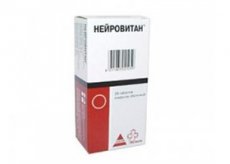Medical expert of the article
New publications
Preparations
Neurovitane
Last reviewed: 04.07.2025

All iLive content is medically reviewed or fact checked to ensure as much factual accuracy as possible.
We have strict sourcing guidelines and only link to reputable media sites, academic research institutions and, whenever possible, medically peer reviewed studies. Note that the numbers in parentheses ([1], [2], etc.) are clickable links to these studies.
If you feel that any of our content is inaccurate, out-of-date, or otherwise questionable, please select it and press Ctrl + Enter.

Neurovitan helps to replenish the deficiency of B-vitamins.
 [ 1 ]
[ 1 ]
Indications Neurovitana
It is used to treat diseases affecting the functioning of the nervous system:
- neuralgia with polyneuritis and myalgia;
- paresthesia or neuritis;
- paralysis and its nervous form;
- arthralgia or lumbago.
Release form
The therapeutic element is released in tablets, 10 pieces per blister pack; there are 3 such packs in a pack.
Pharmacodynamics
The effect of the drug is due to the activity of the vitamin complex. Octothiamin is a combination of thioctacid and thiamine; it has a longer and more pronounced effect than thiamine alone. Thiamine is an important component necessary for the stable functioning of nerve cells and carbohydrate metabolism processes.
Riboflavin is involved in hematopoietic processes, as well as the metabolism of proteins with fats and carbohydrates.
Pyridoxine promotes the restoration of nerve receptors and the liver, and at the same time actively participates in protein metabolism processes.
Cyanocobalamin is involved in the processes of biological oxidation of fats with proteins. It catalyzes the conversion of homocysteine amino acid into methionine, and also helps bind myelin. It is often used to eliminate anemia.
Pharmacokinetics
The medicine is well absorbed into the circulatory system, passes into all vital tissues with organs. After 1.5 hours, it becomes almost impossible to determine the presence of Neurovitan in the body. Excretion is realized through the kidneys.
Dosing and administration
The medication is used for oral administration.
Directions for use for adults.
Take 1-4 tablets per day for a 1-month period.
During pregnancy, as well as in a preventive regimen, the drug is taken 1 tablet per day within a 0.5-1 month period. After the birth of a child and during breastfeeding, the daily portion size can be equal to 2 tablets, and the cycle has a similar duration.
Medication administration regimens for children.
The age group 8-14 years old should take 1-3 tablets per day.
For children aged 3-7 years – 1 tablet per day.
If permitted, a child aged 1-3 years may be prescribed a quarter or half a tablet per day (1 dose).
The treatment cycle for any age category can be 0.5-1 month - the doctor determines the more precise duration.
 [ 2 ]
[ 2 ]
Use Neurovitana during pregnancy
The medication should be prescribed to pregnant women with extreme caution (especially in the 1st trimester).
Thiamine with cyanocobalamin and pyridoxine can be excreted in breast milk.
At high pyridoxine levels, the process of prolactin release may be impaired, and milk production may be suppressed, which is why the drug should be used with caution in breastfeeding mothers. No tests have been performed to determine the degree of vitamin excretion in breast milk. The decision to discontinue the drug or stop breastfeeding should be made taking into account the woman’s need to take it. If this is absolutely necessary, breastfeeding should be discontinued for the duration of therapy.
Contraindications
Main contraindications:
- the presence of a strong allergy to the elements of the drug;
- erythrocytosis or erythremia, as well as thromboembolism;
- ulcerative lesion affecting the gastrointestinal tract;
- an already present allergy of any origin.
Side effects Neurovitana
Side effects include:
- itching in the eye area, a feeling of severe weakness and an increase in temperature;
- hot flashes, tachycardia and increase or decrease in blood pressure;
- urticaria, anaphylaxis and Quincke's edema;
- dryness affecting the oral mucosa, nausea, hyperhidrosis and belching.
Overdose
Very long-term use of high doses of the drug may cause:
- liver enzyme dysfunction and hypercoagulation;
- allergic rash on the epidermis, ataxia with neuropathy and heart pain;
- deterioration of neural conductivity.
If such symptoms develop, you should stop therapy and consult a doctor.
Storage conditions
Neurovitan must be stored in a place closed to children. Temperature indicators - no higher than 25°C.
Shelf life
Neurovitan can be used for a period of 3 years from the date of production of the therapeutic drug.
Application for children
The medicine is not used in pediatrics (children under 3 years of age).
Analogues
The analogs of the drug are Beviplex, Neurobeks, Neuron with Beforten, as well as Milgamma, Neuromultivit with Bekovit and B-vitamin Complex.
Attention!
To simplify the perception of information, this instruction for use of the drug "Neurovitane" translated and presented in a special form on the basis of the official instructions for medical use of the drug. Before use read the annotation that came directly to medicines.
Description provided for informational purposes and is not a guide to self-healing. The need for this drug, the purpose of the treatment regimen, methods and dose of the drug is determined solely by the attending physician. Self-medication is dangerous for your health.

